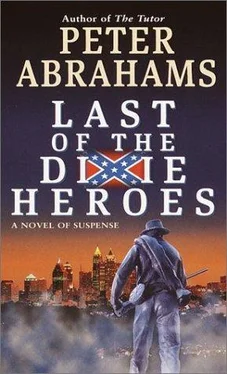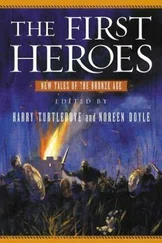Peter Abrahams - Last of the Dixie Heroes
Здесь есть возможность читать онлайн «Peter Abrahams - Last of the Dixie Heroes» весь текст электронной книги совершенно бесплатно (целиком полную версию без сокращений). В некоторых случаях можно слушать аудио, скачать через торрент в формате fb2 и присутствует краткое содержание. Жанр: Триллер, на английском языке. Описание произведения, (предисловие) а так же отзывы посетителей доступны на портале библиотеки ЛибКат.
- Название:Last of the Dixie Heroes
- Автор:
- Жанр:
- Год:неизвестен
- ISBN:нет данных
- Рейтинг книги:4 / 5. Голосов: 1
-
Избранное:Добавить в избранное
- Отзывы:
-
Ваша оценка:
- 80
- 1
- 2
- 3
- 4
- 5
Last of the Dixie Heroes: краткое содержание, описание и аннотация
Предлагаем к чтению аннотацию, описание, краткое содержание или предисловие (зависит от того, что написал сам автор книги «Last of the Dixie Heroes»). Если вы не нашли необходимую информацию о книге — напишите в комментариях, мы постараемся отыскать её.
Last of the Dixie Heroes — читать онлайн бесплатно полную книгу (весь текст) целиком
Ниже представлен текст книги, разбитый по страницам. Система сохранения места последней прочитанной страницы, позволяет с удобством читать онлайн бесплатно книгу «Last of the Dixie Heroes», без необходимости каждый раз заново искать на чём Вы остановились. Поставьте закладку, и сможете в любой момент перейти на страницу, на которой закончили чтение.
Интервал:
Закладка:
He calmed down a little, now that he’d reached this understanding, was getting a grip on the basic forces way down deep. While he was calming down and figuring out the physics of his difficulties, if any, the cell phone buzzed, still in his hand for some reason.
“Rhett?” he said.
But it was someone from the phone company, answering his call about the service problem. “Your line has been disconnected due to lack of payment.”
So what? He had his cell phone. The joke was on them. A technological solution existed for every technological problem. He’d learned that along the way, where exactly he couldn’t remember. Had Jerry said that? Or Carol? He kind of missed them, wondered if they ended up getting married, maybe on the last tape. That brought the wedding album to mind, out the window. And in that wedding album would be pictures of his mother. He needed them, hardly having any, his ma being the type who didn’t like having her picture taken and always said, “Oh, no, not me.” She also said: “Will you look at that sky, Roy-blue as your eyes and not a cloud in it!” But he’d never taken her advice, never really looked at the sky until Chickamauga.
Roy went to the nearest window, checked the sky: hazy brown, like some storm was blowing in off a desert. Roy had never been to the desert, had no desire to. He liked it lush-was just realizing that about himself now. Meanwhile, was this the window where he’d jettisoned the wedding album? Roy opened it and climbed out.
Bad planning.
He climbed back in, got Old Grand-Dad, climbed out again.
Roy was in the little yard in front of his house. He walked across it a few times, saw that the grass needed cutting, weeding, liming, fertilizing, didn’t see the wedding album. That walking back and forth had made him thirsty. A sip of Old Grand-Dad took care of that. A jogger went by, gave him a look and then another, speeded up. The speeded-up part might have been his imagination, but the trash cans lined up on the sidewalk were real, everyone’s trash but his. Pickup day: he had a problem. Didn’t have to be good at filling in the blanks-and Roy knew he wasn’t-to piece together what had happened: wedding album out the window, scooped up by some passerby, dropped in a plastic barrel.
But which one?
Made sense to start with the nearest, didn’t it? Perfect sense. Roy went to the nearest trash barrel, pried off the round plastic top, checked inside. Empty cans of dog food, sections of the Journal-Constitution, crushed milk cartons; Roy pushed all that aside, dug down beneath kitchen-size white plastic bags-no sense looking inside those, no one would have packed the wedding album away like that-down and down to a level that was sticky and moist. Roy withdrew his hand: red, red, red. But not blood: one quick taste proved that. Ketchup. He caught a glimpse of bent paper plates, french fries, partial hamburgers, the meat coated in congealed white fat. Below the paper plates lay the promising white corner of something. Roy picked up the trash barrel, dumped it out. There was a little explosion, but that was just a passing car running over an empty economy-size bottle of Coke that was rolling around out there for some reason. The promising white corner? Must have been that Sharper Image catalog, now coming to pieces out in the street.
Roy moved on to the next barrel. And wouldn’t you know it? Right on top, first thing he saw: the wedding album. He glanced around, saw that others had witnessed this little triumph, shook his head at the irony of it all, sharing a rueful moment with his neighbors, although he didn’t actually recognize anybody, before crossing the yard and climbing back in through the window.
Roy looked through the wedding album. He didn’t see his ma anywhere. For a minute or two he reasoned along the lines of her camera shyness. Then he remembered something key: his ma had died a few months before the wedding. How had he forgotten a fact like that? He smashed the bottle of Old Grand-Dad against the wall. Luck was with him: he had another, although how that had come about wasn’t clear.
No pictures of his ma, but plenty of Marcia, smiling from every page. Roy crumpled up some newspapers, tossed them in the fireplace, piled on some logs, or maybe not logs but pieces of broken furniture he happened to have lying around, built a roaring fire. He flipped the wedding album in on top. The flames crackled and rose higher. Roy watched it burn, felt the heat, thought: Atlanta.
Not the time of year for fires, of course, made the room much too hot. Roy went down to the basement, much cooler there. Must have been the temperature change that did it, causing an air supply problem. Roy took the inhaler from his pocket, squeezed it into his mouth. Empty. Hadn’t he got some new ones? He sorted through drugstore memories, got nowhere, winged the empty inhaler across the room, not hard, just winging, but it hit one of the street-level windows. Smash. Tinkle.
The basement had indoor-outdoor carpeting, the color of a putting green. Roy lay down on it for a rest. He started dreaming right away. He was at the top of the waterfall; Lee was down below on the rock, fishing with her hands the way she did. She leaped up suddenly with her catch, not a brown fish this time, but a brown human head. Then came a horrified little shout, and Roy woke up, covered in sweat.
Something was digging into his leg. Another inhaler? He took it out. The cell phone.
Almost before he knew it he was calling Lee.
“I’m at home,” he said.
“Yes?”
Roy hadn’t worked out anything to say. “I wondered whether you’d like to come over.” Silence. “Or go out for coffee or something.”
“Outside 1863?” Lee said.
“I’m sorry?”
“Seeing each other not in the context of 1863, is that what you mean?”
“I guess so,” said Roy.
“I don’t think that’s a good idea right now,” Lee said.
“Why not?”
“I think you know.”
“I don’t,” Roy said. He followed that with something that shamed him as he said it, something he would probably have never uttered if that dream hadn’t shaken him up: “I thought you loved me.”
“I do.”
Roy waited for her to elaborate. She said nothing. He waited. Was she waiting too? What for? He clicked off.
The phone buzzed right away. She was going to clear this up. But it was Gordo, not Lee.
“Hey, Roy, been trying to reach you. Did you know your home phone’s out of order?”
“Must be some mistake.”
“Roy? Are you all right?”
“As rain.”
“You don’t sound too good.”
“Battery’s getting low.”
Pause. “Guess where I’m calling from, Roy?”
“Chickamauga.”
“Why would I be there now? I’m at Sippens Isuzu.”
“Trading in the Altima?”
“No, Roy, although I might, sooner rather than later-be getting a good deal now. I’ve started on the service desk.”
“You’re not making much sense, Gordo.”
“The job I was telling you about-Earl’s hired me.”
“He’s one lousy goddamned leader,” Roy said.
“Are you kidding?” said Gordo. “Sippens Enterprises made an after-tax profit of three million dollars last year-Earl showed me the books.”
“Who gives a shit?” said Roy. “I’m talking about in the field.”
Pause. “You all right, Roy?”
“What did I say the last time you asked?”
“Right as rain, something of that nature.”
“I’m saying it again.”
Roy heard Gordo take a deep breath; maybe he was having air supply problems too. “The thing is, Roy, I have it on pretty good authority that if you gave Earl a call he might be amenable to doing something for you too.”
“Lost me.”
“Call Earl,” Gordo said. “He’ll give you a job on the service desk.”
Читать дальшеИнтервал:
Закладка:
Похожие книги на «Last of the Dixie Heroes»
Представляем Вашему вниманию похожие книги на «Last of the Dixie Heroes» списком для выбора. Мы отобрали схожую по названию и смыслу литературу в надежде предоставить читателям больше вариантов отыскать новые, интересные, ещё непрочитанные произведения.
Обсуждение, отзывы о книге «Last of the Dixie Heroes» и просто собственные мнения читателей. Оставьте ваши комментарии, напишите, что Вы думаете о произведении, его смысле или главных героях. Укажите что конкретно понравилось, а что нет, и почему Вы так считаете.












